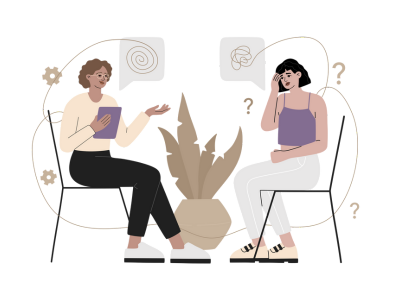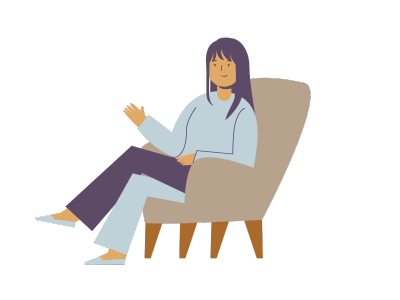Therapy for Sexual Addiction
Step into a space where you’re heard, understood, and supported—by a whole team that cares deeply. In-person or virtual sex addiction therapy for navigating life’s hardest moments.

At Alliance for Healing, you’ll find a guide—not just a therapist. Our team walks alongside you with creativity, compassion, and clinical expertise, helping you build the tools to move forward with clarity and strength.
You Can’t Undo the Past, But You Can Choose What Happens Next.
When sexual addiction or compulsive sexual behavior becomes part of your life or relationship, it can feel like everything is unraveling. You may be overwhelmed by secrecy, shame, or a sense of being out of control. As an individual, you might feel trapped in patterns you don’t fully understand, struggling with guilt, anxiety, or isolation. As a couple, it can feel like you’re navigating broken trust, painful discoveries, and conversations that feel too heavy to hold. At Alliance for Healing, we understand this is not just a behavioral issue. It’s a complex emotional experience that affects your sense of identity, safety, and connection. Our approach in sex addiction therapy offers expert, compassionate support designed to meet you where you are, whether you’re seeking help on your own or as a couple.
Therapy for Sexual Addiction can help with:
Feeling Out of Control
You keep promising yourself it’s the last time, but the behavior keeps repeating and you don’t know how to stop.
Hiding the Truth
The fear of being found out is exhausting, and the guilt never really goes away.
Shame and Isolation
You feel ashamed of your choices and afraid to ask for help. You feel completely alone.
The Pain of Disclosure
Whether you’re the one sharing or the one hearing the truth, disclosure is overwhelming. You’re unsure what to say, how much to share, or how to move forward after everything changes.
Rebuilding
You don’t know how to rebuild trust, but you know you want to try.


After meeting with our expert team, we’ll help determine the best path forward—whether that includes calming the nervous system through low-frequency neurofeedback or using creative therapies to explore what’s often hard to put into words.
Whether you’re here as an individual or as a couple, you’ll be welcomed by a team in sex addiction therapy that brings both compassion and clinical expertise. We’re here to help you face the truth, heal what’s been damaged, and move toward lasting change with clarity, accountability, and support.
We Accept a Variety of Insurances. Contact Our Team to See If Your Session Is Covered.
Why Consider Seeking Help for Sexual Addiction?

Land In a Safe Space
When you’re struggling with sexual addiction, it can be hard to talk to friends or loved ones—especially when guilt, fear, or broken trust are already weighing heavily. You might worry about being judged, misunderstood, or rejected. Therapy offers a confidential space where you can be honest about what’s happening, explore the deeper patterns behind the behavior, and begin the work of healing without having to hide or protect anyone else’s feelings.

Get What You Need
Sex addiction therapy is personalized to the patterns, pain, and challenges you’re facing—whether it’s secrecy, shame, broken trust, or feeling stuck in cycles you can’t control. After meeting with our experienced team, we’ll work with you to create a path forward that supports accountability, healing, and growth. Together, we’ll help you rebuild trust, restore connection, and take meaningful steps toward lasting change.
Frequently Asked Questions:
Do you take insurance and how does that work?
We accept a variety of insurance plans that help cover therapy sessions. As insurance carriers and plans often change, we ask that you call us at (651) 493-8150 or email us at admin@aheartt.com to determine if we are within your network plan.
We also encourage our clients to speak with your insurance carriers for more information on your coverage type and benefits. Here are a few questions that might be worth asking:
- What is the coverage amount per therapy session?
- How many therapy sessions does my plan cover?
- How much does my insurance pay for an out-of-network provider?
- Is approval required from my primary care physician?
What Is Therapy Like?
Therapy can be short- or long-term to cope with a specific issue, work through thought or behavior patterns, or engage in personal development. You can generally expect to discuss current events, your personal history and insights. The goal is to bring what you learn in therapy sessions into your everyday life. Your therapist may suggest some things you can do outside of therapy to support your process, such as reading a book, journaling, taking notice of particular behaviors or taking action on goals.
Your therapist will ensure a safe environment that promotes small action steps to bring about significant changes.
Will our conversations remain confidential?
Everything discussed in sessions remains highly confidential and protected, as confidentiality is one of the most important components between a client and a psychotherapist. Successful therapy requires a high degree of trust with sensitive subjects usually not discussed. A written release of information is necessary to share your information with anyone in your healthcare team.
What about medication vs. psychotherapy?
Our clinic does not provide medication management services; not all people in psychotherapy require medications. Therapy addresses the causes of distress and the behavior patterns which inhibit progress. In some cases, a combination of medication and therapy may be the right course of action; work with your medical doctor to determine what is best for you.
Getting Started Is Easy

Step 1: Reach Out
Fill out the form to take the first step toward change. If you’re ready, you can also book a free consultation to explore how we can support you.

Step 2: Begin Therapy
After your consultation and intake, you’ll start your sessions—designed to help you navigate challenges with clarity, awareness, and compassion.

Step 3: Feel Like You Again
As you move through the therapy process, you may start to feel more grounded, more present, and more connected to yourself—shifting from struggle toward meaningful change.

Submit your contact information here and you’ll be redirected to our scheduling portal to book your free consultation and connect with the therapist you connect with the most.

Locations
Arden Hills
8 Pine Tree Drive, Suite 250
Arden Hills, MN 55112
White Bear Lake
4505 White Bear Pkwy, Suite 1500
White Bear Lake, MN 55110
Contact Us
Call
(651) 493-8150
Fax
(651) 493-9335
admin@aheartt.com
